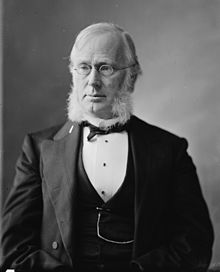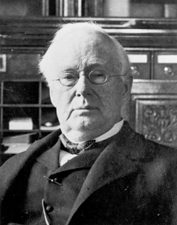George Frisbie Hoar


George Frisbie Hoar (29 August 1826 – 30 September 1904) was a prominent American politician and United States Senator from Massachusetts.
| This article about a political figure is a stub. You can help out with Wikiquote by expanding it! |
Quotes
[edit]Subjugation of the Philippines Iniquitous (1902)
[edit]- You have sacrificed nearly ten thousand American lives–the flower of our youth. You have devastated provinces. You have slain uncounted thousands of the people you desire to benefit. You have established reconcentration camps. Your generals are coming home from their harvest bringing sheaves with them, in the shape of other thousands of sick and wounded and insane to drag out miserable lives, wrecked in body and mind. You make the American flag in the eyes of a numerous people the emblem of sacrilege in Christian churches, and of the burning of human dwellings, and of the horror of the water torture.
- Your practical statesmanship which disdains to take George Washington and Abraham Lincoln or the soldiers of the Revolution or of the Civil War as models, has looked in some cases to Spain for your example. I believe–nay, I know–that in general our officers and soldiers are humane. But in some cases they have carried on your warfare with a mixture of American ingenuity and Castilian cruelty.
- Your practical statesmanship has succeeded in converting a people who three years ago were ready to kiss the hem of the garment of the American and to welcome him as a liberator, who thronged after your men when they landed on those islands with benediction and gratitude, into sullen and irreconcilable enemies, possessed of a hatred which centuries can not eradicate.
Quoted in the book “The Making of the President, 1960” by Theodore White “The men who do the work of piety and charity in our churches, the men who administer our school system, the men who own and till their own farms, the men who perform skilled labor in the shops, the soldiers, the men who went to war and stayed all through, the men who paid the debt and kept the currency sound and saved the nation’s honor, the men who saved the country in war and have made it worth living in peace, commonly and as a rule, by the natural law of their being find their places in the Republican party. While the old slave-owner and slave-driver, the saloon keeper, the ballot box stuffer, the Ku Klux Klan, the criminal class of the great cities, the men who cannot read or write, commonly and as a rule, by the natural law of their being, find their congenial place in the Democratic party.”
Quotes about George Frisbie Hoar
[edit]- He embodied all the virtues of the classic New Englander and few of the vices. His loyalty was granite-ribbed; he revered the Constitution and all the institutions born and reared under it. He was proud of the United States, but his heart belonged to Massachusetts. In his mouth the name took on a beauty and an emotion which never ceased to stir me-Westerner that I was. Combined with his patriotic loyalties was a passionate devotion to classic literature-Greek, Roman, English. He knew yards of Homer and Virgil, as well as of the greatest of the early English writers, and not infrequently at our Sunday morning breakfasts he would repeat long passages in his sonorous voice. "Earning money is hateful to me," he said. "Never in all my life before have I undertaken a thing I did not want to do simply for money. Some things I like to do, believe that I can do better than I could do anything else. I never was such a donkey before. There are so many things I long to do; one of them is to learn Italian well enough to read Dante and Boccaccio and Ariosto in the original; and I want to commit Homer to memory. I would like to have my head packed with Greek." The Senator's Sunday morning talks were rich with anecdotes of New England types. He had his antipathies-Margaret Fuller Ossoli was one of them.
- Ida Tarbell, All in the Day's Work (1939)
- I have certainly never known anyone for whom life at seventy was more joyous and full. He hated weakness, as well as everything that impaired his dignity, his self-reliance. He was a true untouchable and would fall into a rage if friend or stranger offered to assist him.
- Ida Tarbell, All in the Day's Work (1939)
- this was the Senator on a vacation, the Senator of our Sunday morning's breakfast. Take him when public affairs were in a serious tangle, and he was glum, unapproachable. He suffered deeply over the trend to imperialism after the Spanish-American War. To save Cuba from the maladministration of Spain, to watch over her until she had learned to govern herself seemed to him a noble expression of Americanism, but to annex lands on the other side of the globe for commercial purposes only, as he believed, was to be false to all our ideals. He had the early American conviction that minding one's own business was even more important abroad than at home. He wanted no entangling alliances, and in those days following the treaty of Paris he feared as never before for the country. His greatest speech against the advancing imperialism was made in April of 1900. At the head of the printed copy of his speech distributed by the Senate he placed these sentences: “No right under the Constitution to hold Subject States. To every People belongs the right to establish its own government in its own way. The United States can not with honor buy the title of a dispossessed tyrant, or crush a Republic." I was learning something of what responsibility means for a man charged with public service, of the clash of personalities, of ambitions, judgments, ideals.
- Ida Tarbell, All in the Day's Work (1939)


